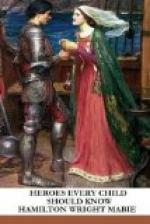Among the cadets at this time were my eldest brother, Custis, who graduated first in his class in 1854, and my father’s nephew, Fitz Lee, a third classman, besides other relatives and friends. Saturday being a half—holiday for the cadets, it was the custom for all social events in which they were to take part to be placed on that afternoon or evening. Nearly every Saturday a number of these young men were invited to our house to tea, or supper, for it was a good, substantial meal. The misery of some of these lads, owing to embarrassment, possibly from awe of the Superintendent, was pitiable and evident even to me, a boy of ten or twelve years old. But as soon as my father got command, as it were, of the situation, one could see how quickly most of them were put at their ease. He would address himself to the task of making them feel comfortable and at home, and his genial manner and pleasant ways at once succeeded.
In the spring of 1853 my grandmother, Mrs. Custis, died. This was the first death in our immediate family. She was very dear to us, and was admired, esteemed, and loved by all who had ever known her. Bishop Meade, of Virginia, writes of her:
“Mrs. Mary Custis, of Arlington, the wife of Mr. Washington Custis, grandson of Mrs. General Washington, was the daughter of Mr. William Fitzhugh, of Chatham. Scarcely is there a Christian lady in our land more honoured than she was, and none more loved and esteemed. For good sense, prudence, sincerity, benevolence, unaffected piety, disinterested zeal in every good work, deep humanity and retiring modesty—for all the virtues which adorn the wife, the mother, and the friend—I never knew her superior.”
In a letter written to my mother soon after this sad event my father says:
“May God give you strength to enable you to bear and say, ’His will be done.’ She has gone from all trouble, care and sorrow to a holy immortality, there to rejoice and praise forever the God and Saviour she so long and truly served. Let that be our comfort and that our consolation. May our death be like hers, and may we meet in happiness in Heaven.”
In another letter about the same time he writes:
“She was to me all that a mother could be, and I yield to none in admiration for her character, love for her virtues, and veneration for her memory.”
At this time, my father’s family and friends persuaded him to allow R. S. Weir, Professor of Painting and Drawing at the Academy, to paint his portrait. As far as I remember, there was only one sitting, and the artist had to finish it from memory or from the glimpses he obtained of his subject in the regular course of their daily lives at “The Point.” This picture shows my father in the undress uniform of a Colonel of Engineers, [Footnote: His appointment of Superintendent of the Military Academy earned with it the temporary rank of Colonel of Engineers] and many think it a very good likeness. To me, the expression of strength peculiar to his face is wanting, and the mouth fails to portray that sweetness of disposition so characteristic of his countenance. Still, it was like him at that time. My father never could bear to have his picture taken, and there are no likenesses of him that really give his sweet expression. Sitting for a picture was such a serious business with him that he never could “look pleasant.”




